COVID-19 Impact: Academic Study Skills and Online University Classes
VerifiedAdded on 2023/06/15
|12
|3752
|388
Report
AI Summary
This report explores the impact of the COVID-19 pandemic on university education, focusing on the shift to online learning and its effects on students' academic study skills. It discusses the advantages of online learning, such as refined critical thinking, improved virtual communication, better time management, new technical skills, demonstrated self-motivation, a broader global perspective, and added flexibility. Simultaneously, it addresses disadvantages like inability to focus on screens, sense of isolation, managing screen time, technology issues, and the need for self-discipline. The report concludes that while online learning presents challenges, it also offers opportunities for students to develop essential skills for academic success. A self-reflection section is included to evaluate the learning and research process.
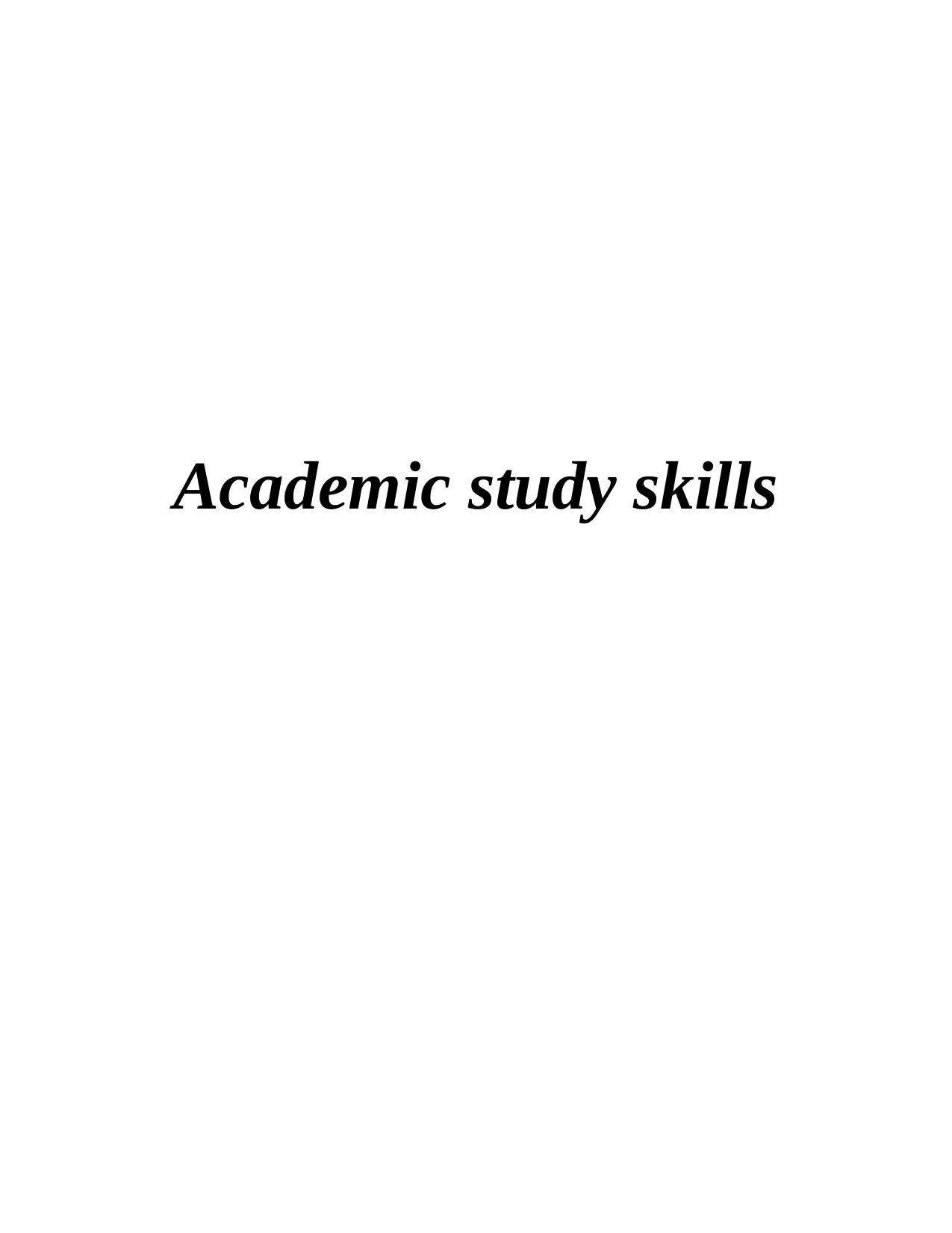
Academic study skills
Paraphrase This Document
Need a fresh take? Get an instant paraphrase of this document with our AI Paraphraser
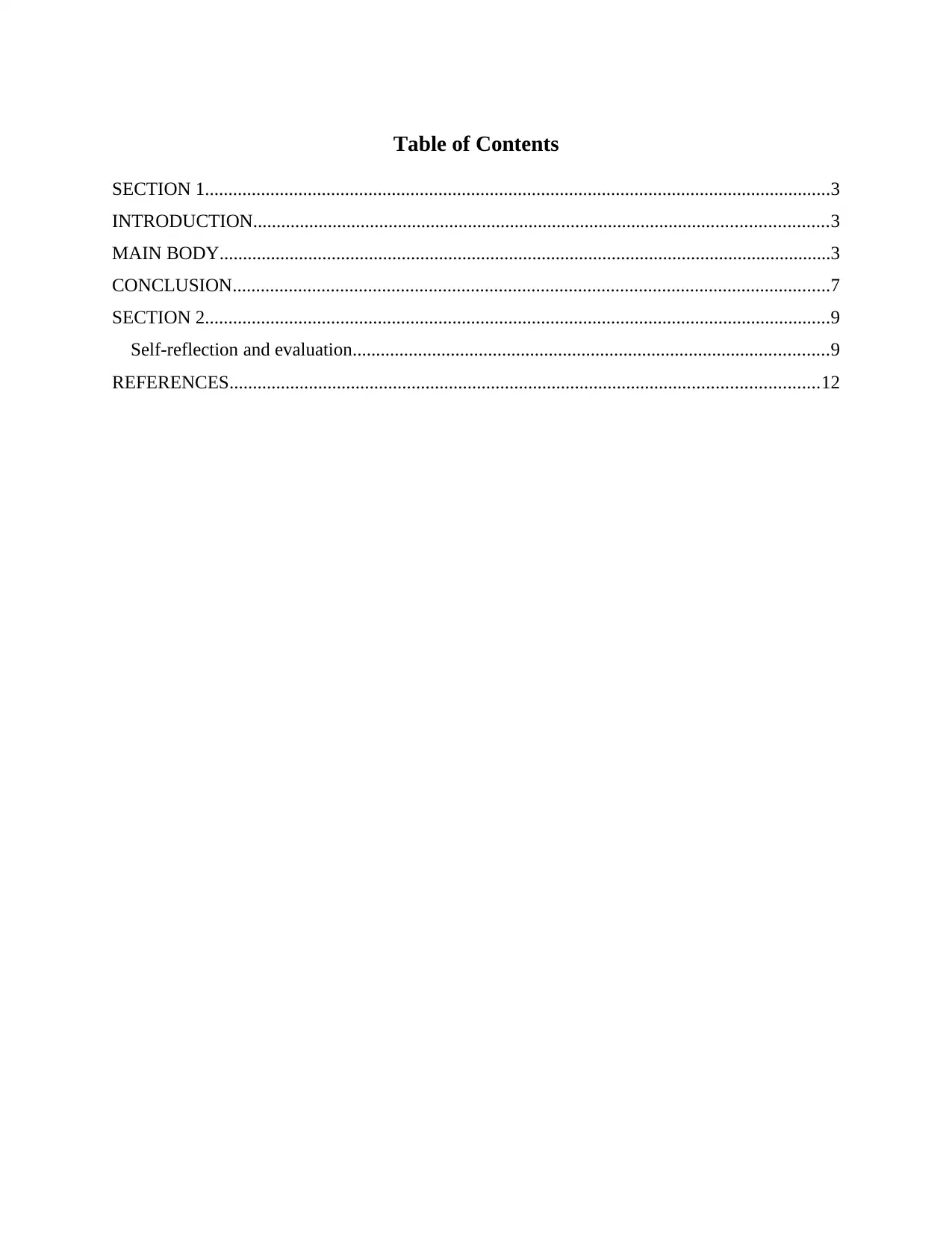
Table of Contents
SECTION 1......................................................................................................................................3
INTRODUCTION...........................................................................................................................3
MAIN BODY...................................................................................................................................3
CONCLUSION................................................................................................................................7
SECTION 2......................................................................................................................................9
Self-reflection and evaluation......................................................................................................9
REFERENCES..............................................................................................................................12
SECTION 1......................................................................................................................................3
INTRODUCTION...........................................................................................................................3
MAIN BODY...................................................................................................................................3
CONCLUSION................................................................................................................................7
SECTION 2......................................................................................................................................9
Self-reflection and evaluation......................................................................................................9
REFERENCES..............................................................................................................................12
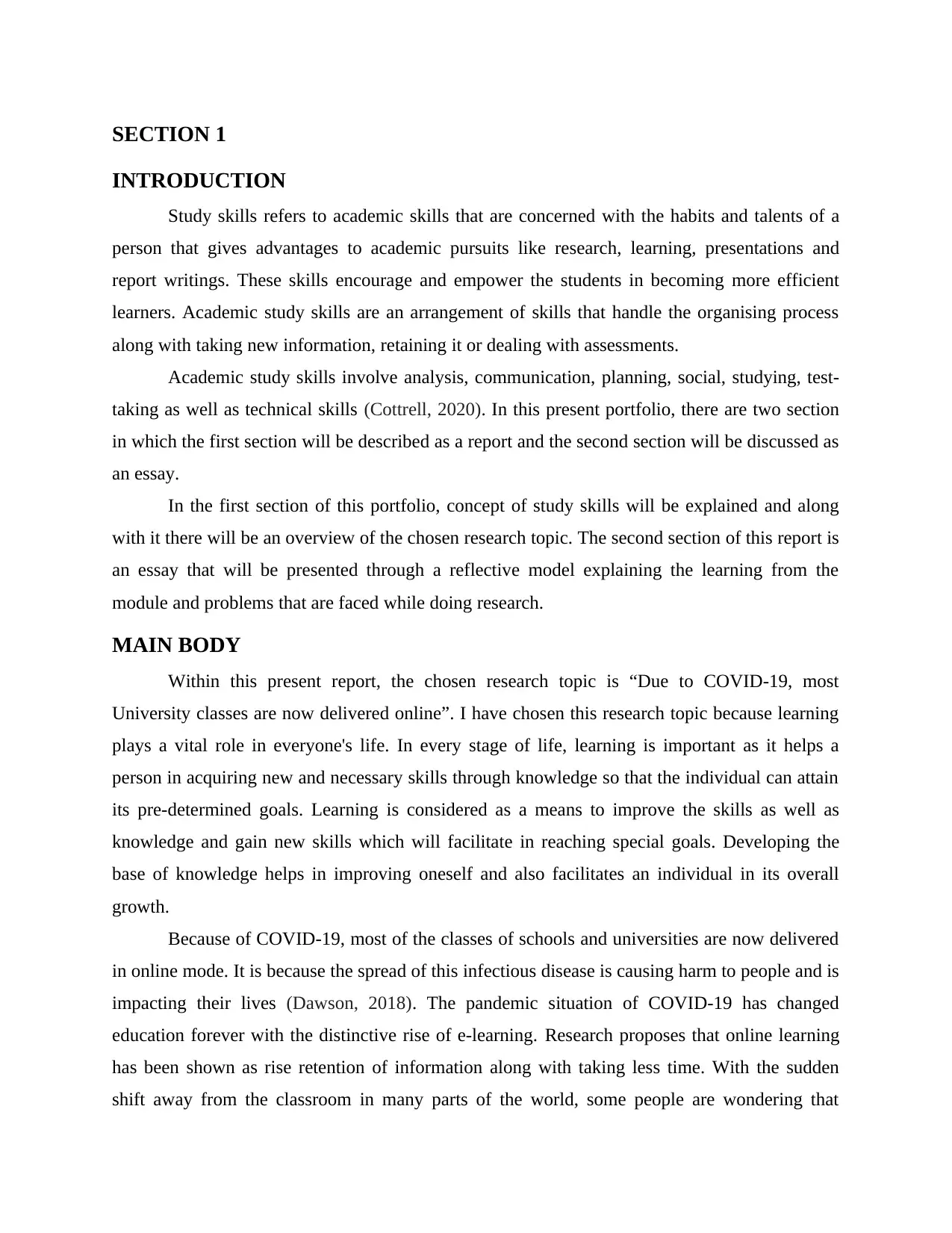
SECTION 1
INTRODUCTION
Study skills refers to academic skills that are concerned with the habits and talents of a
person that gives advantages to academic pursuits like research, learning, presentations and
report writings. These skills encourage and empower the students in becoming more efficient
learners. Academic study skills are an arrangement of skills that handle the organising process
along with taking new information, retaining it or dealing with assessments.
Academic study skills involve analysis, communication, planning, social, studying, test-
taking as well as technical skills (Cottrell, 2020). In this present portfolio, there are two section
in which the first section will be described as a report and the second section will be discussed as
an essay.
In the first section of this portfolio, concept of study skills will be explained and along
with it there will be an overview of the chosen research topic. The second section of this report is
an essay that will be presented through a reflective model explaining the learning from the
module and problems that are faced while doing research.
MAIN BODY
Within this present report, the chosen research topic is “Due to COVID-19, most
University classes are now delivered online”. I have chosen this research topic because learning
plays a vital role in everyone's life. In every stage of life, learning is important as it helps a
person in acquiring new and necessary skills through knowledge so that the individual can attain
its pre-determined goals. Learning is considered as a means to improve the skills as well as
knowledge and gain new skills which will facilitate in reaching special goals. Developing the
base of knowledge helps in improving oneself and also facilitates an individual in its overall
growth.
Because of COVID-19, most of the classes of schools and universities are now delivered
in online mode. It is because the spread of this infectious disease is causing harm to people and is
impacting their lives (Dawson, 2018). The pandemic situation of COVID-19 has changed
education forever with the distinctive rise of e-learning. Research proposes that online learning
has been shown as rise retention of information along with taking less time. With the sudden
shift away from the classroom in many parts of the world, some people are wondering that
INTRODUCTION
Study skills refers to academic skills that are concerned with the habits and talents of a
person that gives advantages to academic pursuits like research, learning, presentations and
report writings. These skills encourage and empower the students in becoming more efficient
learners. Academic study skills are an arrangement of skills that handle the organising process
along with taking new information, retaining it or dealing with assessments.
Academic study skills involve analysis, communication, planning, social, studying, test-
taking as well as technical skills (Cottrell, 2020). In this present portfolio, there are two section
in which the first section will be described as a report and the second section will be discussed as
an essay.
In the first section of this portfolio, concept of study skills will be explained and along
with it there will be an overview of the chosen research topic. The second section of this report is
an essay that will be presented through a reflective model explaining the learning from the
module and problems that are faced while doing research.
MAIN BODY
Within this present report, the chosen research topic is “Due to COVID-19, most
University classes are now delivered online”. I have chosen this research topic because learning
plays a vital role in everyone's life. In every stage of life, learning is important as it helps a
person in acquiring new and necessary skills through knowledge so that the individual can attain
its pre-determined goals. Learning is considered as a means to improve the skills as well as
knowledge and gain new skills which will facilitate in reaching special goals. Developing the
base of knowledge helps in improving oneself and also facilitates an individual in its overall
growth.
Because of COVID-19, most of the classes of schools and universities are now delivered
in online mode. It is because the spread of this infectious disease is causing harm to people and is
impacting their lives (Dawson, 2018). The pandemic situation of COVID-19 has changed
education forever with the distinctive rise of e-learning. Research proposes that online learning
has been shown as rise retention of information along with taking less time. With the sudden
shift away from the classroom in many parts of the world, some people are wondering that
⊘ This is a preview!⊘
Do you want full access?
Subscribe today to unlock all pages.

Trusted by 1+ million students worldwide
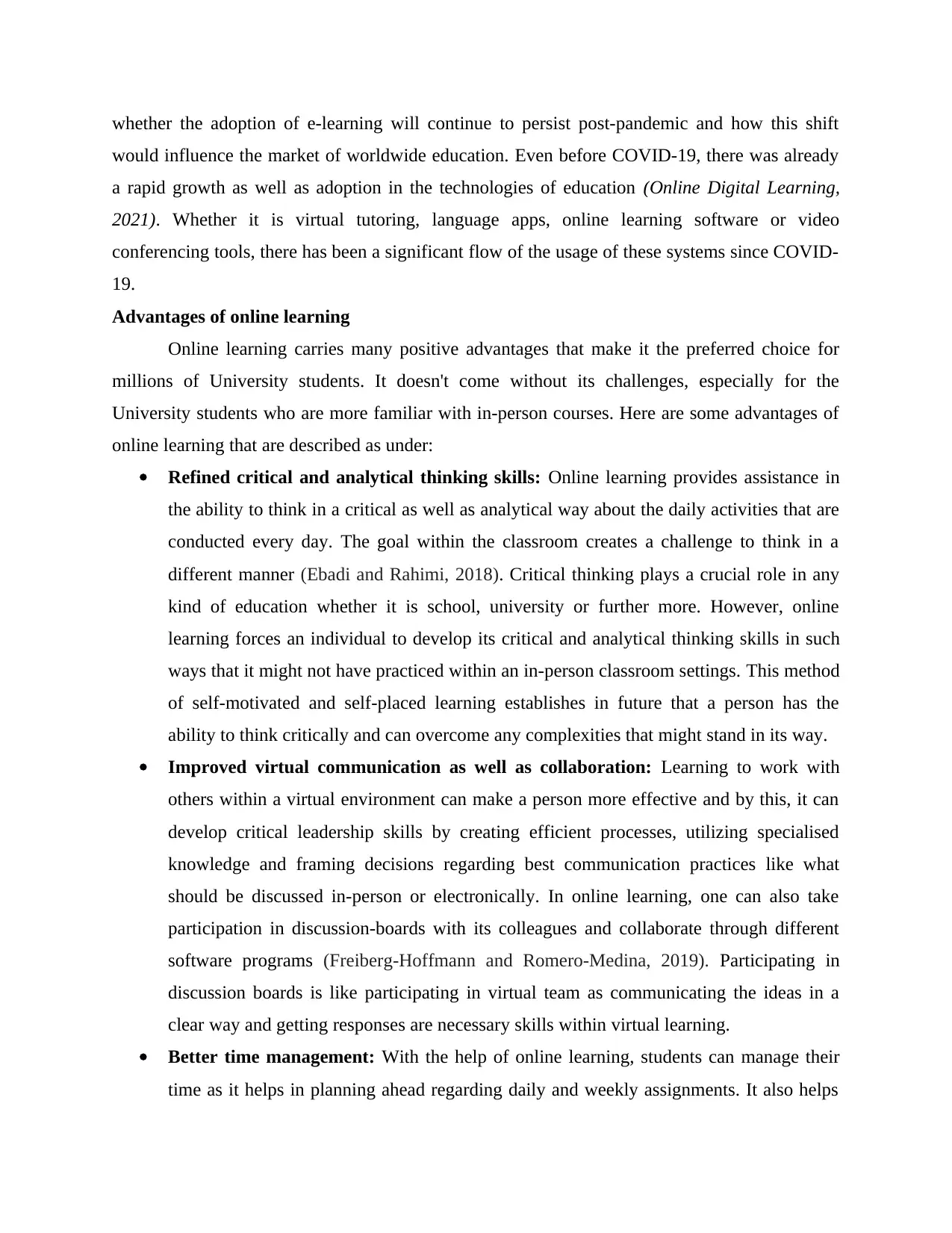
whether the adoption of e-learning will continue to persist post-pandemic and how this shift
would influence the market of worldwide education. Even before COVID-19, there was already
a rapid growth as well as adoption in the technologies of education (Online Digital Learning,
2021). Whether it is virtual tutoring, language apps, online learning software or video
conferencing tools, there has been a significant flow of the usage of these systems since COVID-
19.
Advantages of online learning
Online learning carries many positive advantages that make it the preferred choice for
millions of University students. It doesn't come without its challenges, especially for the
University students who are more familiar with in-person courses. Here are some advantages of
online learning that are described as under:
Refined critical and analytical thinking skills: Online learning provides assistance in
the ability to think in a critical as well as analytical way about the daily activities that are
conducted every day. The goal within the classroom creates a challenge to think in a
different manner (Ebadi and Rahimi, 2018). Critical thinking plays a crucial role in any
kind of education whether it is school, university or further more. However, online
learning forces an individual to develop its critical and analytical thinking skills in such
ways that it might not have practiced within an in-person classroom settings. This method
of self-motivated and self-placed learning establishes in future that a person has the
ability to think critically and can overcome any complexities that might stand in its way.
Improved virtual communication as well as collaboration: Learning to work with
others within a virtual environment can make a person more effective and by this, it can
develop critical leadership skills by creating efficient processes, utilizing specialised
knowledge and framing decisions regarding best communication practices like what
should be discussed in-person or electronically. In online learning, one can also take
participation in discussion-boards with its colleagues and collaborate through different
software programs (Freiberg-Hoffmann and Romero-Medina, 2019). Participating in
discussion boards is like participating in virtual team as communicating the ideas in a
clear way and getting responses are necessary skills within virtual learning.
Better time management: With the help of online learning, students can manage their
time as it helps in planning ahead regarding daily and weekly assignments. It also helps
would influence the market of worldwide education. Even before COVID-19, there was already
a rapid growth as well as adoption in the technologies of education (Online Digital Learning,
2021). Whether it is virtual tutoring, language apps, online learning software or video
conferencing tools, there has been a significant flow of the usage of these systems since COVID-
19.
Advantages of online learning
Online learning carries many positive advantages that make it the preferred choice for
millions of University students. It doesn't come without its challenges, especially for the
University students who are more familiar with in-person courses. Here are some advantages of
online learning that are described as under:
Refined critical and analytical thinking skills: Online learning provides assistance in
the ability to think in a critical as well as analytical way about the daily activities that are
conducted every day. The goal within the classroom creates a challenge to think in a
different manner (Ebadi and Rahimi, 2018). Critical thinking plays a crucial role in any
kind of education whether it is school, university or further more. However, online
learning forces an individual to develop its critical and analytical thinking skills in such
ways that it might not have practiced within an in-person classroom settings. This method
of self-motivated and self-placed learning establishes in future that a person has the
ability to think critically and can overcome any complexities that might stand in its way.
Improved virtual communication as well as collaboration: Learning to work with
others within a virtual environment can make a person more effective and by this, it can
develop critical leadership skills by creating efficient processes, utilizing specialised
knowledge and framing decisions regarding best communication practices like what
should be discussed in-person or electronically. In online learning, one can also take
participation in discussion-boards with its colleagues and collaborate through different
software programs (Freiberg-Hoffmann and Romero-Medina, 2019). Participating in
discussion boards is like participating in virtual team as communicating the ideas in a
clear way and getting responses are necessary skills within virtual learning.
Better time management: With the help of online learning, students can manage their
time as it helps in planning ahead regarding daily and weekly assignments. It also helps
Paraphrase This Document
Need a fresh take? Get an instant paraphrase of this document with our AI Paraphraser
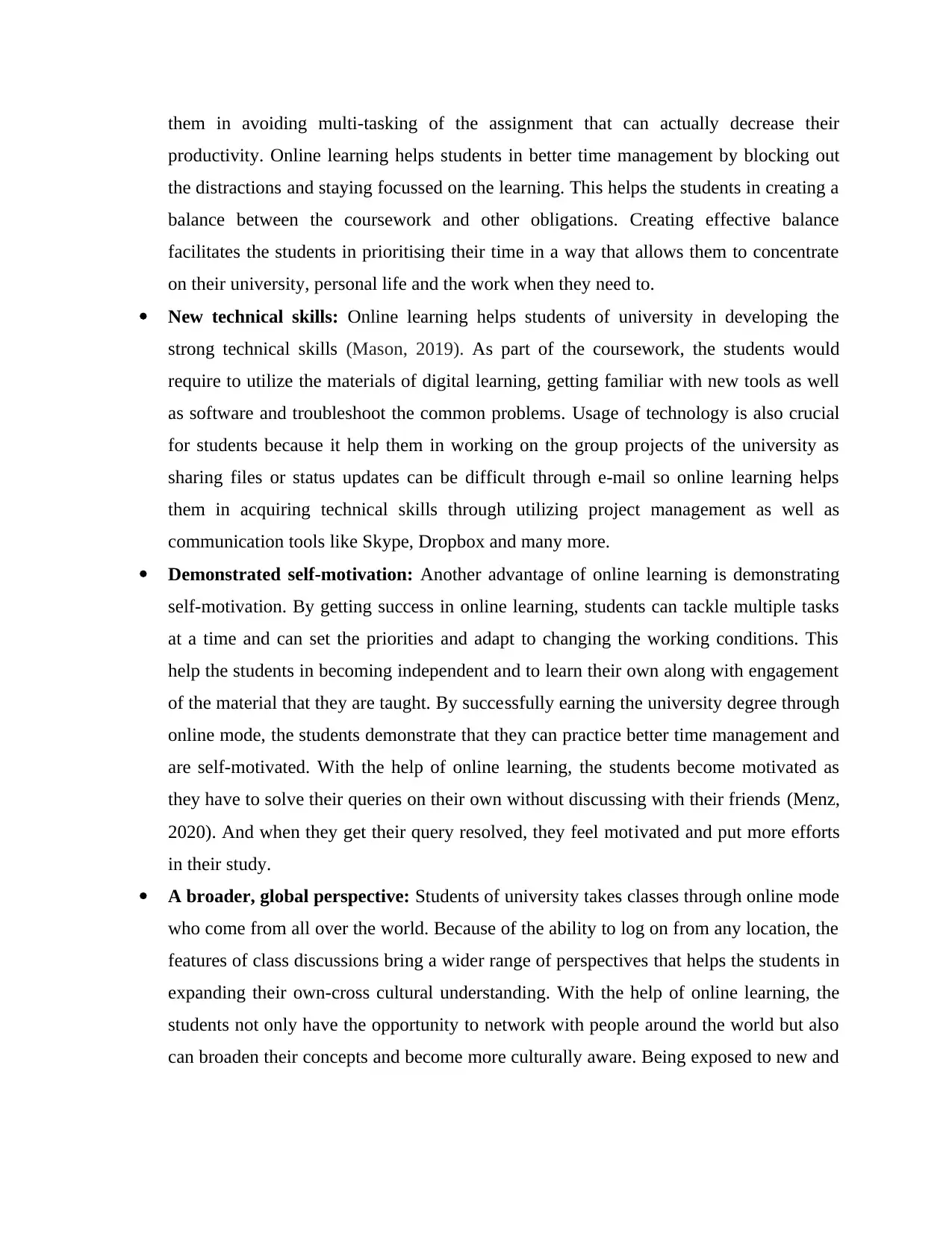
them in avoiding multi-tasking of the assignment that can actually decrease their
productivity. Online learning helps students in better time management by blocking out
the distractions and staying focussed on the learning. This helps the students in creating a
balance between the coursework and other obligations. Creating effective balance
facilitates the students in prioritising their time in a way that allows them to concentrate
on their university, personal life and the work when they need to.
New technical skills: Online learning helps students of university in developing the
strong technical skills (Mason, 2019). As part of the coursework, the students would
require to utilize the materials of digital learning, getting familiar with new tools as well
as software and troubleshoot the common problems. Usage of technology is also crucial
for students because it help them in working on the group projects of the university as
sharing files or status updates can be difficult through e-mail so online learning helps
them in acquiring technical skills through utilizing project management as well as
communication tools like Skype, Dropbox and many more.
Demonstrated self-motivation: Another advantage of online learning is demonstrating
self-motivation. By getting success in online learning, students can tackle multiple tasks
at a time and can set the priorities and adapt to changing the working conditions. This
help the students in becoming independent and to learn their own along with engagement
of the material that they are taught. By successfully earning the university degree through
online mode, the students demonstrate that they can practice better time management and
are self-motivated. With the help of online learning, the students become motivated as
they have to solve their queries on their own without discussing with their friends (Menz,
2020). And when they get their query resolved, they feel motivated and put more efforts
in their study.
A broader, global perspective: Students of university takes classes through online mode
who come from all over the world. Because of the ability to log on from any location, the
features of class discussions bring a wider range of perspectives that helps the students in
expanding their own-cross cultural understanding. With the help of online learning, the
students not only have the opportunity to network with people around the world but also
can broaden their concepts and become more culturally aware. Being exposed to new and
productivity. Online learning helps students in better time management by blocking out
the distractions and staying focussed on the learning. This helps the students in creating a
balance between the coursework and other obligations. Creating effective balance
facilitates the students in prioritising their time in a way that allows them to concentrate
on their university, personal life and the work when they need to.
New technical skills: Online learning helps students of university in developing the
strong technical skills (Mason, 2019). As part of the coursework, the students would
require to utilize the materials of digital learning, getting familiar with new tools as well
as software and troubleshoot the common problems. Usage of technology is also crucial
for students because it help them in working on the group projects of the university as
sharing files or status updates can be difficult through e-mail so online learning helps
them in acquiring technical skills through utilizing project management as well as
communication tools like Skype, Dropbox and many more.
Demonstrated self-motivation: Another advantage of online learning is demonstrating
self-motivation. By getting success in online learning, students can tackle multiple tasks
at a time and can set the priorities and adapt to changing the working conditions. This
help the students in becoming independent and to learn their own along with engagement
of the material that they are taught. By successfully earning the university degree through
online mode, the students demonstrate that they can practice better time management and
are self-motivated. With the help of online learning, the students become motivated as
they have to solve their queries on their own without discussing with their friends (Menz,
2020). And when they get their query resolved, they feel motivated and put more efforts
in their study.
A broader, global perspective: Students of university takes classes through online mode
who come from all over the world. Because of the ability to log on from any location, the
features of class discussions bring a wider range of perspectives that helps the students in
expanding their own-cross cultural understanding. With the help of online learning, the
students not only have the opportunity to network with people around the world but also
can broaden their concepts and become more culturally aware. Being exposed to new and
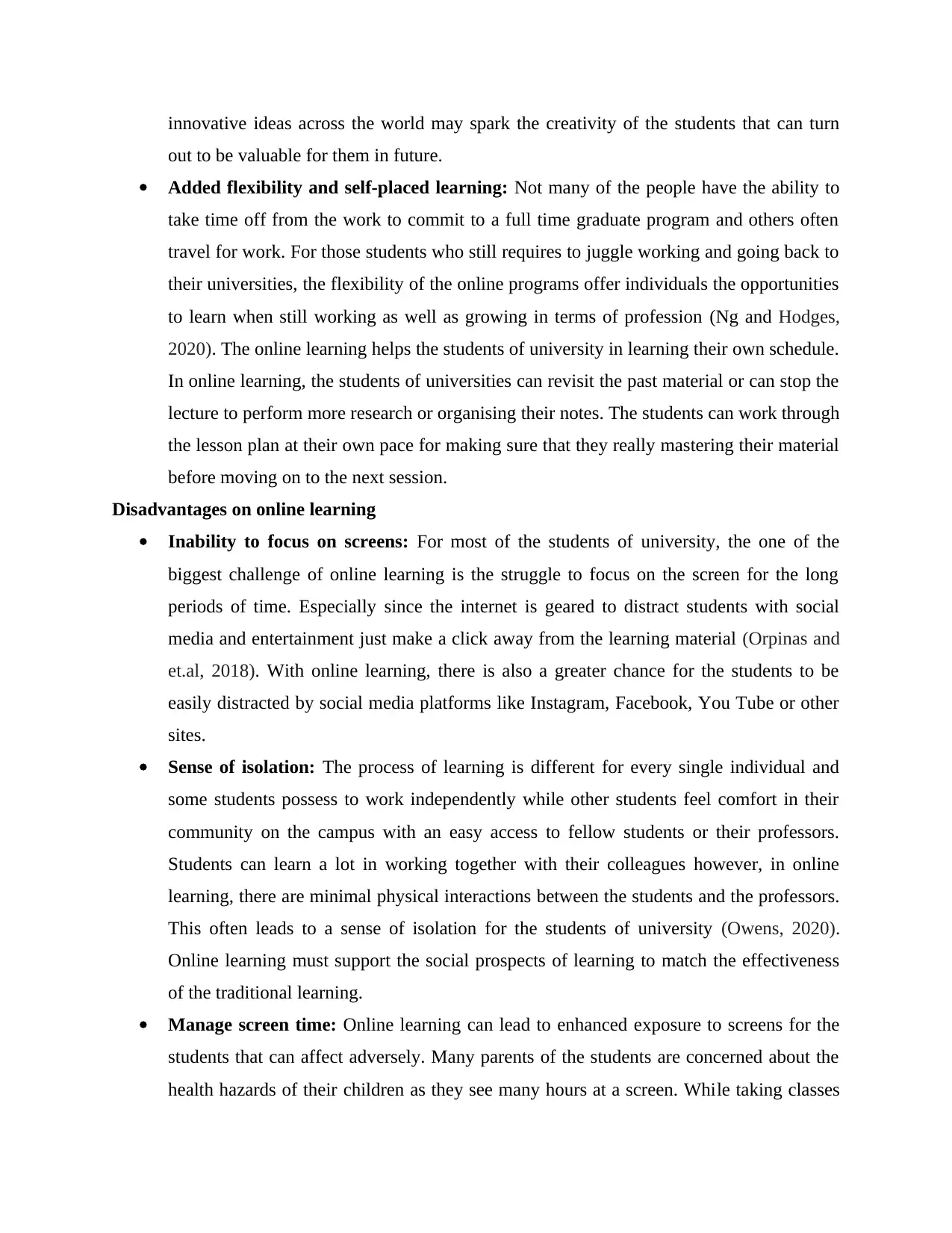
innovative ideas across the world may spark the creativity of the students that can turn
out to be valuable for them in future.
Added flexibility and self-placed learning: Not many of the people have the ability to
take time off from the work to commit to a full time graduate program and others often
travel for work. For those students who still requires to juggle working and going back to
their universities, the flexibility of the online programs offer individuals the opportunities
to learn when still working as well as growing in terms of profession (Ng and Hodges,
2020). The online learning helps the students of university in learning their own schedule.
In online learning, the students of universities can revisit the past material or can stop the
lecture to perform more research or organising their notes. The students can work through
the lesson plan at their own pace for making sure that they really mastering their material
before moving on to the next session.
Disadvantages on online learning
Inability to focus on screens: For most of the students of university, the one of the
biggest challenge of online learning is the struggle to focus on the screen for the long
periods of time. Especially since the internet is geared to distract students with social
media and entertainment just make a click away from the learning material (Orpinas and
et.al, 2018). With online learning, there is also a greater chance for the students to be
easily distracted by social media platforms like Instagram, Facebook, You Tube or other
sites.
Sense of isolation: The process of learning is different for every single individual and
some students possess to work independently while other students feel comfort in their
community on the campus with an easy access to fellow students or their professors.
Students can learn a lot in working together with their colleagues however, in online
learning, there are minimal physical interactions between the students and the professors.
This often leads to a sense of isolation for the students of university (Owens, 2020).
Online learning must support the social prospects of learning to match the effectiveness
of the traditional learning.
Manage screen time: Online learning can lead to enhanced exposure to screens for the
students that can affect adversely. Many parents of the students are concerned about the
health hazards of their children as they see many hours at a screen. While taking classes
out to be valuable for them in future.
Added flexibility and self-placed learning: Not many of the people have the ability to
take time off from the work to commit to a full time graduate program and others often
travel for work. For those students who still requires to juggle working and going back to
their universities, the flexibility of the online programs offer individuals the opportunities
to learn when still working as well as growing in terms of profession (Ng and Hodges,
2020). The online learning helps the students of university in learning their own schedule.
In online learning, the students of universities can revisit the past material or can stop the
lecture to perform more research or organising their notes. The students can work through
the lesson plan at their own pace for making sure that they really mastering their material
before moving on to the next session.
Disadvantages on online learning
Inability to focus on screens: For most of the students of university, the one of the
biggest challenge of online learning is the struggle to focus on the screen for the long
periods of time. Especially since the internet is geared to distract students with social
media and entertainment just make a click away from the learning material (Orpinas and
et.al, 2018). With online learning, there is also a greater chance for the students to be
easily distracted by social media platforms like Instagram, Facebook, You Tube or other
sites.
Sense of isolation: The process of learning is different for every single individual and
some students possess to work independently while other students feel comfort in their
community on the campus with an easy access to fellow students or their professors.
Students can learn a lot in working together with their colleagues however, in online
learning, there are minimal physical interactions between the students and the professors.
This often leads to a sense of isolation for the students of university (Owens, 2020).
Online learning must support the social prospects of learning to match the effectiveness
of the traditional learning.
Manage screen time: Online learning can lead to enhanced exposure to screens for the
students that can affect adversely. Many parents of the students are concerned about the
health hazards of their children as they see many hours at a screen. While taking classes
⊘ This is a preview!⊘
Do you want full access?
Subscribe today to unlock all pages.

Trusted by 1+ million students worldwide
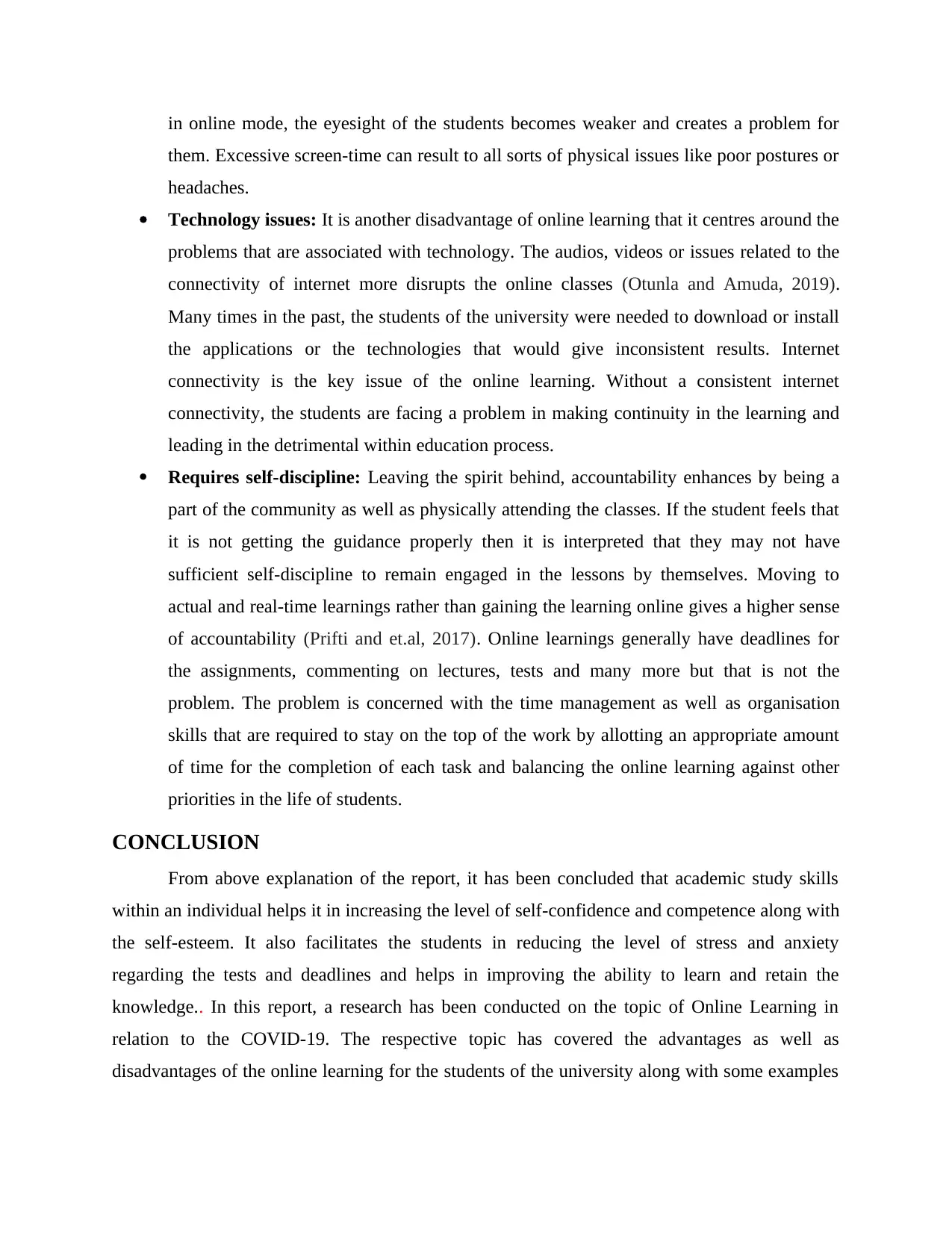
in online mode, the eyesight of the students becomes weaker and creates a problem for
them. Excessive screen-time can result to all sorts of physical issues like poor postures or
headaches.
Technology issues: It is another disadvantage of online learning that it centres around the
problems that are associated with technology. The audios, videos or issues related to the
connectivity of internet more disrupts the online classes (Otunla and Amuda, 2019).
Many times in the past, the students of the university were needed to download or install
the applications or the technologies that would give inconsistent results. Internet
connectivity is the key issue of the online learning. Without a consistent internet
connectivity, the students are facing a problem in making continuity in the learning and
leading in the detrimental within education process.
Requires self-discipline: Leaving the spirit behind, accountability enhances by being a
part of the community as well as physically attending the classes. If the student feels that
it is not getting the guidance properly then it is interpreted that they may not have
sufficient self-discipline to remain engaged in the lessons by themselves. Moving to
actual and real-time learnings rather than gaining the learning online gives a higher sense
of accountability (Prifti and et.al, 2017). Online learnings generally have deadlines for
the assignments, commenting on lectures, tests and many more but that is not the
problem. The problem is concerned with the time management as well as organisation
skills that are required to stay on the top of the work by allotting an appropriate amount
of time for the completion of each task and balancing the online learning against other
priorities in the life of students.
CONCLUSION
From above explanation of the report, it has been concluded that academic study skills
within an individual helps it in increasing the level of self-confidence and competence along with
the self-esteem. It also facilitates the students in reducing the level of stress and anxiety
regarding the tests and deadlines and helps in improving the ability to learn and retain the
knowledge.. In this report, a research has been conducted on the topic of Online Learning in
relation to the COVID-19. The respective topic has covered the advantages as well as
disadvantages of the online learning for the students of the university along with some examples
them. Excessive screen-time can result to all sorts of physical issues like poor postures or
headaches.
Technology issues: It is another disadvantage of online learning that it centres around the
problems that are associated with technology. The audios, videos or issues related to the
connectivity of internet more disrupts the online classes (Otunla and Amuda, 2019).
Many times in the past, the students of the university were needed to download or install
the applications or the technologies that would give inconsistent results. Internet
connectivity is the key issue of the online learning. Without a consistent internet
connectivity, the students are facing a problem in making continuity in the learning and
leading in the detrimental within education process.
Requires self-discipline: Leaving the spirit behind, accountability enhances by being a
part of the community as well as physically attending the classes. If the student feels that
it is not getting the guidance properly then it is interpreted that they may not have
sufficient self-discipline to remain engaged in the lessons by themselves. Moving to
actual and real-time learnings rather than gaining the learning online gives a higher sense
of accountability (Prifti and et.al, 2017). Online learnings generally have deadlines for
the assignments, commenting on lectures, tests and many more but that is not the
problem. The problem is concerned with the time management as well as organisation
skills that are required to stay on the top of the work by allotting an appropriate amount
of time for the completion of each task and balancing the online learning against other
priorities in the life of students.
CONCLUSION
From above explanation of the report, it has been concluded that academic study skills
within an individual helps it in increasing the level of self-confidence and competence along with
the self-esteem. It also facilitates the students in reducing the level of stress and anxiety
regarding the tests and deadlines and helps in improving the ability to learn and retain the
knowledge.. In this report, a research has been conducted on the topic of Online Learning in
relation to the COVID-19. The respective topic has covered the advantages as well as
disadvantages of the online learning for the students of the university along with some examples
Paraphrase This Document
Need a fresh take? Get an instant paraphrase of this document with our AI Paraphraser

that are included in the report. The report has been described the impact of COVID-19 on the
education sector and how it influences the pattern of learning.
education sector and how it influences the pattern of learning.
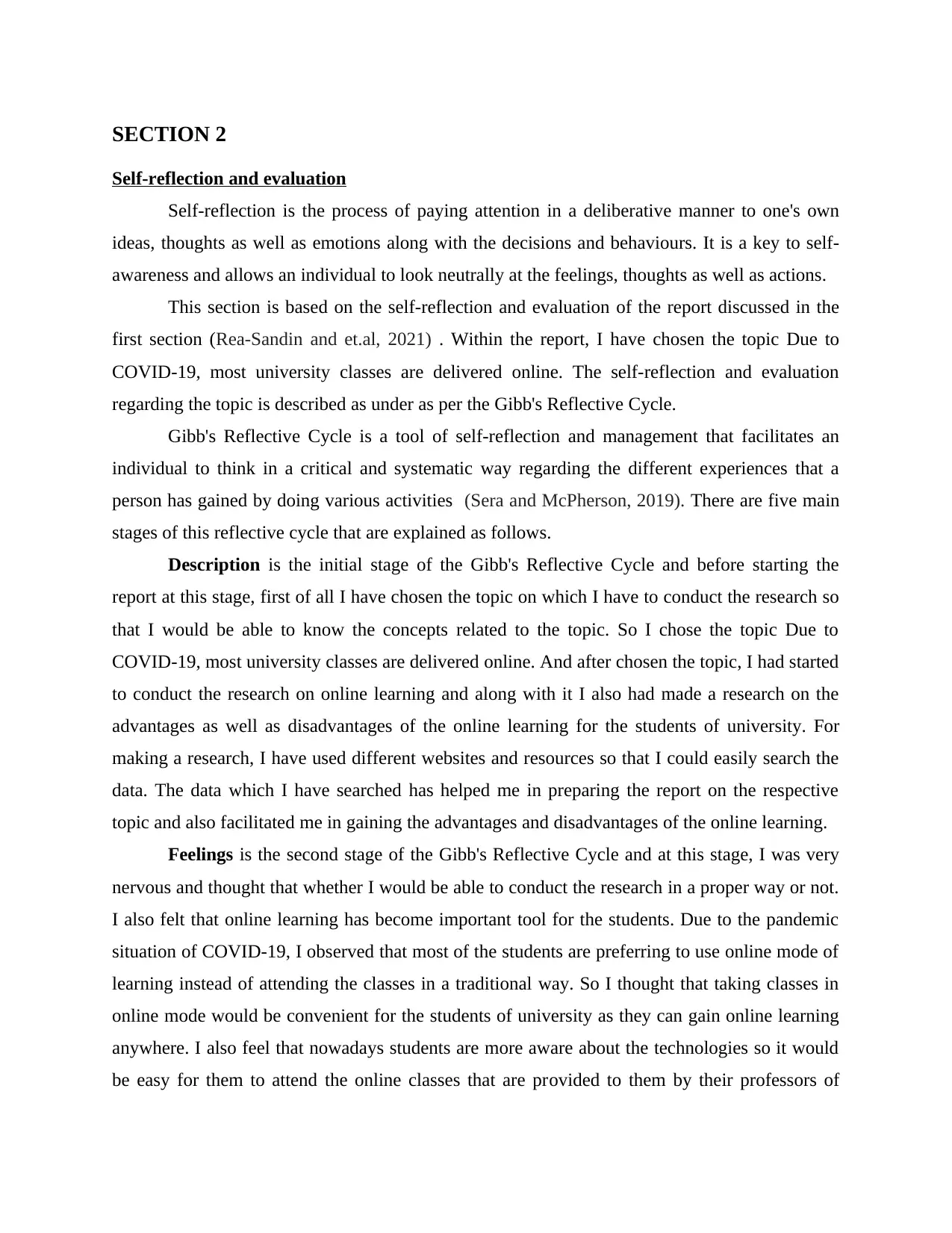
SECTION 2
Self-reflection and evaluation
Self-reflection is the process of paying attention in a deliberative manner to one's own
ideas, thoughts as well as emotions along with the decisions and behaviours. It is a key to self-
awareness and allows an individual to look neutrally at the feelings, thoughts as well as actions.
This section is based on the self-reflection and evaluation of the report discussed in the
first section (Rea‐Sandin and et.al, 2021) . Within the report, I have chosen the topic Due to
COVID-19, most university classes are delivered online. The self-reflection and evaluation
regarding the topic is described as under as per the Gibb's Reflective Cycle.
Gibb's Reflective Cycle is a tool of self-reflection and management that facilitates an
individual to think in a critical and systematic way regarding the different experiences that a
person has gained by doing various activities (Sera and McPherson, 2019). There are five main
stages of this reflective cycle that are explained as follows.
Description is the initial stage of the Gibb's Reflective Cycle and before starting the
report at this stage, first of all I have chosen the topic on which I have to conduct the research so
that I would be able to know the concepts related to the topic. So I chose the topic Due to
COVID-19, most university classes are delivered online. And after chosen the topic, I had started
to conduct the research on online learning and along with it I also had made a research on the
advantages as well as disadvantages of the online learning for the students of university. For
making a research, I have used different websites and resources so that I could easily search the
data. The data which I have searched has helped me in preparing the report on the respective
topic and also facilitated me in gaining the advantages and disadvantages of the online learning.
Feelings is the second stage of the Gibb's Reflective Cycle and at this stage, I was very
nervous and thought that whether I would be able to conduct the research in a proper way or not.
I also felt that online learning has become important tool for the students. Due to the pandemic
situation of COVID-19, I observed that most of the students are preferring to use online mode of
learning instead of attending the classes in a traditional way. So I thought that taking classes in
online mode would be convenient for the students of university as they can gain online learning
anywhere. I also feel that nowadays students are more aware about the technologies so it would
be easy for them to attend the online classes that are provided to them by their professors of
Self-reflection and evaluation
Self-reflection is the process of paying attention in a deliberative manner to one's own
ideas, thoughts as well as emotions along with the decisions and behaviours. It is a key to self-
awareness and allows an individual to look neutrally at the feelings, thoughts as well as actions.
This section is based on the self-reflection and evaluation of the report discussed in the
first section (Rea‐Sandin and et.al, 2021) . Within the report, I have chosen the topic Due to
COVID-19, most university classes are delivered online. The self-reflection and evaluation
regarding the topic is described as under as per the Gibb's Reflective Cycle.
Gibb's Reflective Cycle is a tool of self-reflection and management that facilitates an
individual to think in a critical and systematic way regarding the different experiences that a
person has gained by doing various activities (Sera and McPherson, 2019). There are five main
stages of this reflective cycle that are explained as follows.
Description is the initial stage of the Gibb's Reflective Cycle and before starting the
report at this stage, first of all I have chosen the topic on which I have to conduct the research so
that I would be able to know the concepts related to the topic. So I chose the topic Due to
COVID-19, most university classes are delivered online. And after chosen the topic, I had started
to conduct the research on online learning and along with it I also had made a research on the
advantages as well as disadvantages of the online learning for the students of university. For
making a research, I have used different websites and resources so that I could easily search the
data. The data which I have searched has helped me in preparing the report on the respective
topic and also facilitated me in gaining the advantages and disadvantages of the online learning.
Feelings is the second stage of the Gibb's Reflective Cycle and at this stage, I was very
nervous and thought that whether I would be able to conduct the research in a proper way or not.
I also felt that online learning has become important tool for the students. Due to the pandemic
situation of COVID-19, I observed that most of the students are preferring to use online mode of
learning instead of attending the classes in a traditional way. So I thought that taking classes in
online mode would be convenient for the students of university as they can gain online learning
anywhere. I also feel that nowadays students are more aware about the technologies so it would
be easy for them to attend the online classes that are provided to them by their professors of
⊘ This is a preview!⊘
Do you want full access?
Subscribe today to unlock all pages.

Trusted by 1+ million students worldwide
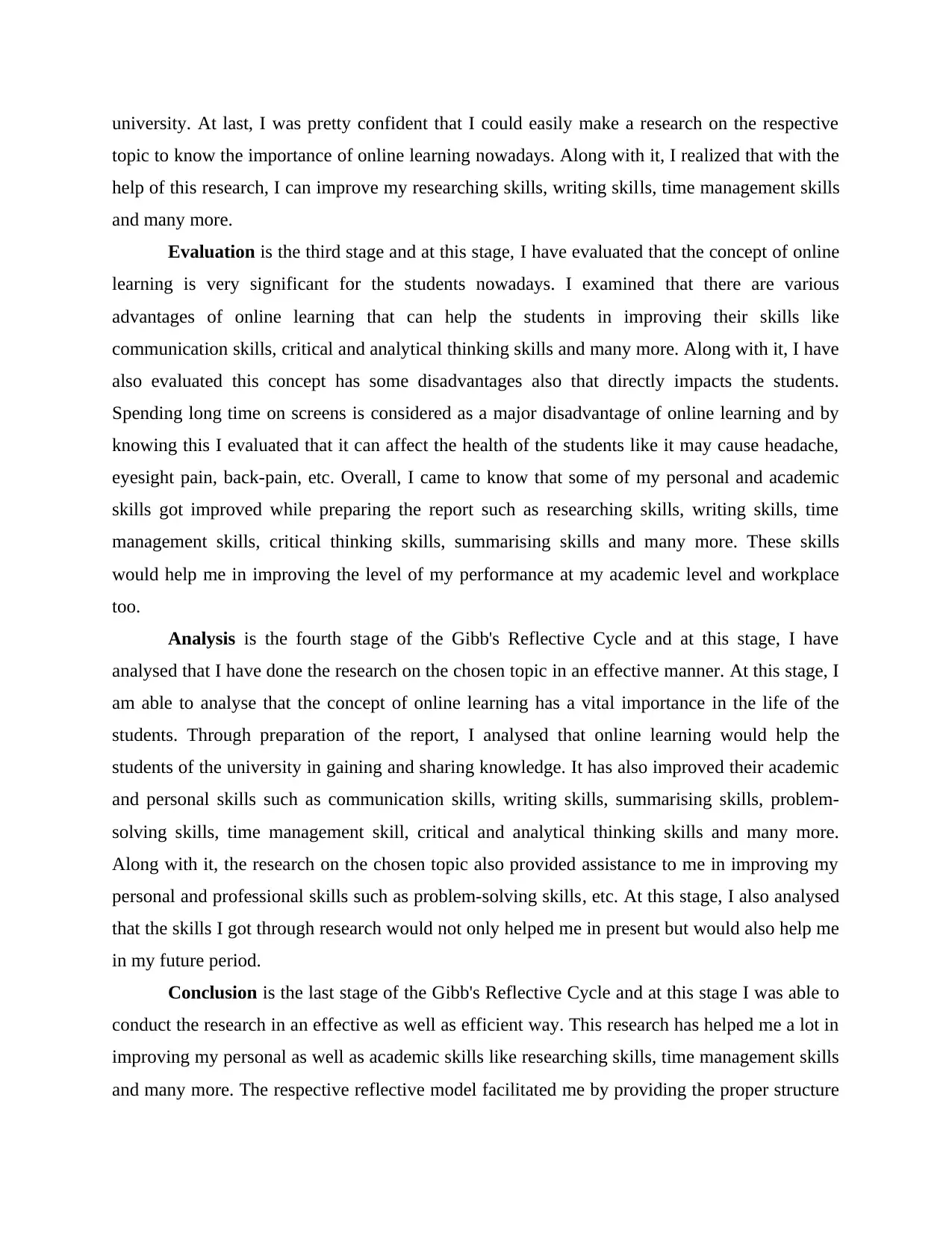
university. At last, I was pretty confident that I could easily make a research on the respective
topic to know the importance of online learning nowadays. Along with it, I realized that with the
help of this research, I can improve my researching skills, writing skills, time management skills
and many more.
Evaluation is the third stage and at this stage, I have evaluated that the concept of online
learning is very significant for the students nowadays. I examined that there are various
advantages of online learning that can help the students in improving their skills like
communication skills, critical and analytical thinking skills and many more. Along with it, I have
also evaluated this concept has some disadvantages also that directly impacts the students.
Spending long time on screens is considered as a major disadvantage of online learning and by
knowing this I evaluated that it can affect the health of the students like it may cause headache,
eyesight pain, back-pain, etc. Overall, I came to know that some of my personal and academic
skills got improved while preparing the report such as researching skills, writing skills, time
management skills, critical thinking skills, summarising skills and many more. These skills
would help me in improving the level of my performance at my academic level and workplace
too.
Analysis is the fourth stage of the Gibb's Reflective Cycle and at this stage, I have
analysed that I have done the research on the chosen topic in an effective manner. At this stage, I
am able to analyse that the concept of online learning has a vital importance in the life of the
students. Through preparation of the report, I analysed that online learning would help the
students of the university in gaining and sharing knowledge. It has also improved their academic
and personal skills such as communication skills, writing skills, summarising skills, problem-
solving skills, time management skill, critical and analytical thinking skills and many more.
Along with it, the research on the chosen topic also provided assistance to me in improving my
personal and professional skills such as problem-solving skills, etc. At this stage, I also analysed
that the skills I got through research would not only helped me in present but would also help me
in my future period.
Conclusion is the last stage of the Gibb's Reflective Cycle and at this stage I was able to
conduct the research in an effective as well as efficient way. This research has helped me a lot in
improving my personal as well as academic skills like researching skills, time management skills
and many more. The respective reflective model facilitated me by providing the proper structure
topic to know the importance of online learning nowadays. Along with it, I realized that with the
help of this research, I can improve my researching skills, writing skills, time management skills
and many more.
Evaluation is the third stage and at this stage, I have evaluated that the concept of online
learning is very significant for the students nowadays. I examined that there are various
advantages of online learning that can help the students in improving their skills like
communication skills, critical and analytical thinking skills and many more. Along with it, I have
also evaluated this concept has some disadvantages also that directly impacts the students.
Spending long time on screens is considered as a major disadvantage of online learning and by
knowing this I evaluated that it can affect the health of the students like it may cause headache,
eyesight pain, back-pain, etc. Overall, I came to know that some of my personal and academic
skills got improved while preparing the report such as researching skills, writing skills, time
management skills, critical thinking skills, summarising skills and many more. These skills
would help me in improving the level of my performance at my academic level and workplace
too.
Analysis is the fourth stage of the Gibb's Reflective Cycle and at this stage, I have
analysed that I have done the research on the chosen topic in an effective manner. At this stage, I
am able to analyse that the concept of online learning has a vital importance in the life of the
students. Through preparation of the report, I analysed that online learning would help the
students of the university in gaining and sharing knowledge. It has also improved their academic
and personal skills such as communication skills, writing skills, summarising skills, problem-
solving skills, time management skill, critical and analytical thinking skills and many more.
Along with it, the research on the chosen topic also provided assistance to me in improving my
personal and professional skills such as problem-solving skills, etc. At this stage, I also analysed
that the skills I got through research would not only helped me in present but would also help me
in my future period.
Conclusion is the last stage of the Gibb's Reflective Cycle and at this stage I was able to
conduct the research in an effective as well as efficient way. This research has helped me a lot in
improving my personal as well as academic skills like researching skills, time management skills
and many more. The respective reflective model facilitated me by providing the proper structure
Paraphrase This Document
Need a fresh take? Get an instant paraphrase of this document with our AI Paraphraser
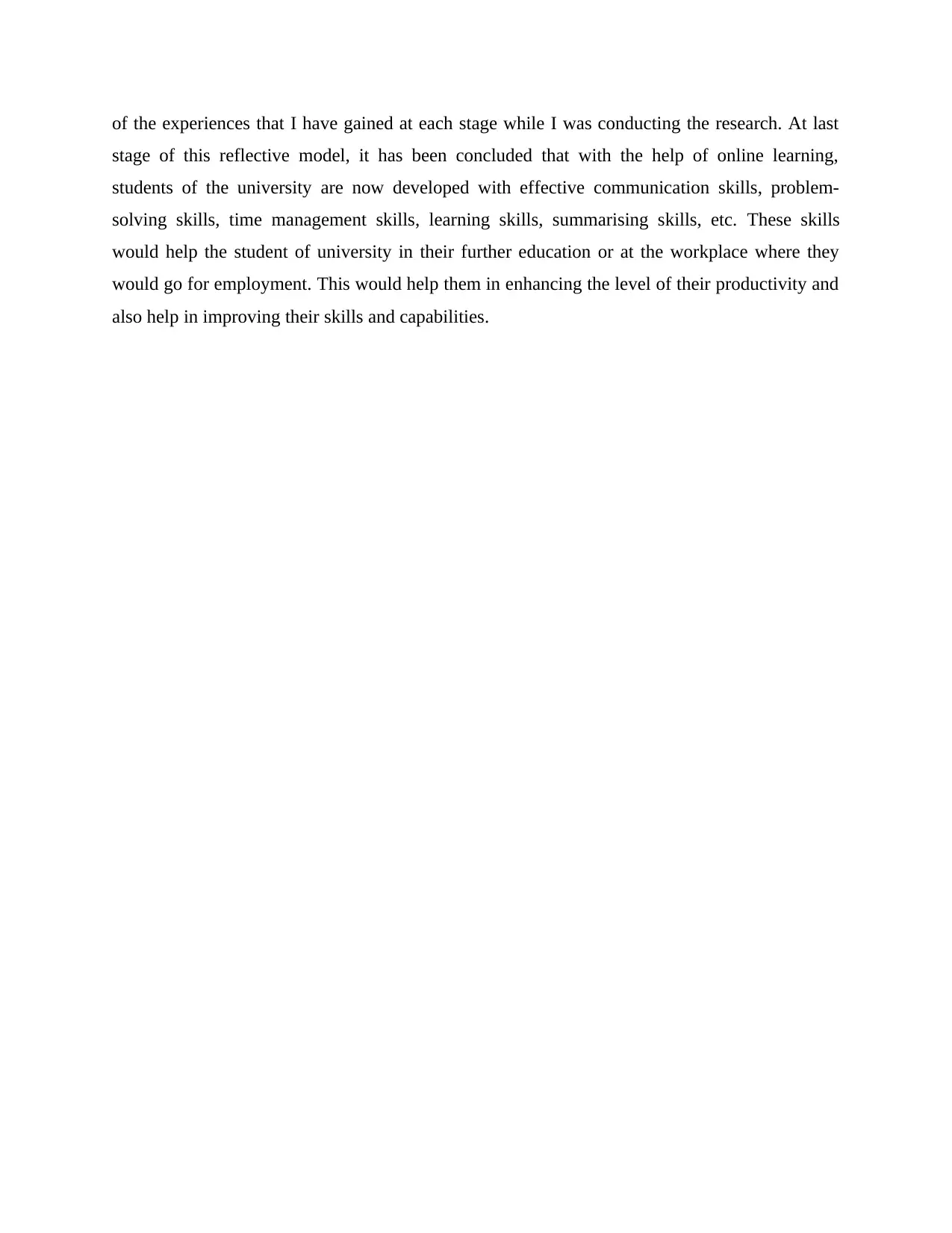
of the experiences that I have gained at each stage while I was conducting the research. At last
stage of this reflective model, it has been concluded that with the help of online learning,
students of the university are now developed with effective communication skills, problem-
solving skills, time management skills, learning skills, summarising skills, etc. These skills
would help the student of university in their further education or at the workplace where they
would go for employment. This would help them in enhancing the level of their productivity and
also help in improving their skills and capabilities.
stage of this reflective model, it has been concluded that with the help of online learning,
students of the university are now developed with effective communication skills, problem-
solving skills, time management skills, learning skills, summarising skills, etc. These skills
would help the student of university in their further education or at the workplace where they
would go for employment. This would help them in enhancing the level of their productivity and
also help in improving their skills and capabilities.
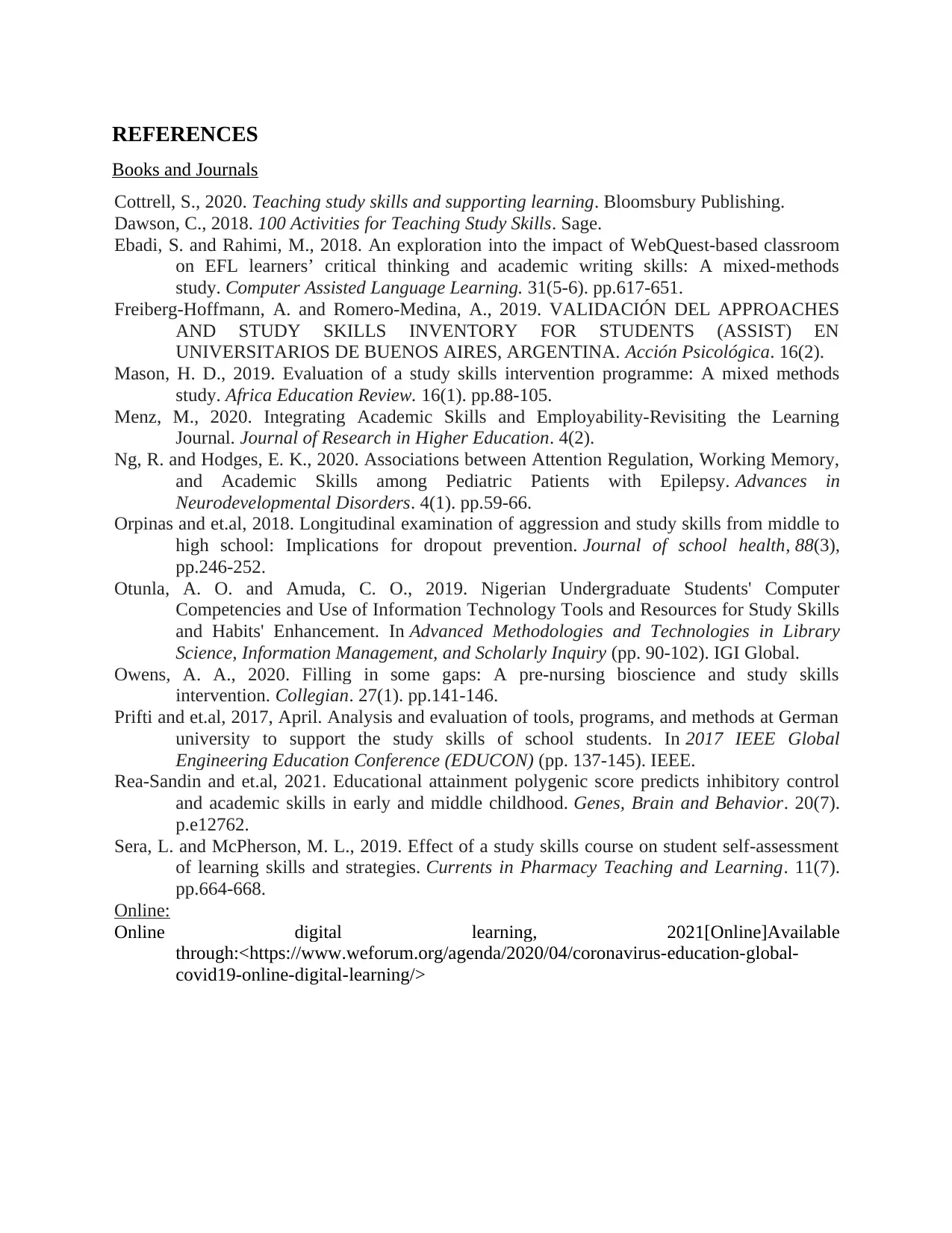
REFERENCES
Books and Journals
Cottrell, S., 2020. Teaching study skills and supporting learning. Bloomsbury Publishing.
Dawson, C., 2018. 100 Activities for Teaching Study Skills. Sage.
Ebadi, S. and Rahimi, M., 2018. An exploration into the impact of WebQuest-based classroom
on EFL learners’ critical thinking and academic writing skills: A mixed-methods
study. Computer Assisted Language Learning. 31(5-6). pp.617-651.
Freiberg-Hoffmann, A. and Romero-Medina, A., 2019. VALIDACIÓN DEL APPROACHES
AND STUDY SKILLS INVENTORY FOR STUDENTS (ASSIST) EN
UNIVERSITARIOS DE BUENOS AIRES, ARGENTINA. Acción Psicológica. 16(2).
Mason, H. D., 2019. Evaluation of a study skills intervention programme: A mixed methods
study. Africa Education Review. 16(1). pp.88-105.
Menz, M., 2020. Integrating Academic Skills and Employability-Revisiting the Learning
Journal. Journal of Research in Higher Education. 4(2).
Ng, R. and Hodges, E. K., 2020. Associations between Attention Regulation, Working Memory,
and Academic Skills among Pediatric Patients with Epilepsy. Advances in
Neurodevelopmental Disorders. 4(1). pp.59-66.
Orpinas and et.al, 2018. Longitudinal examination of aggression and study skills from middle to
high school: Implications for dropout prevention. Journal of school health, 88(3),
pp.246-252.
Otunla, A. O. and Amuda, C. O., 2019. Nigerian Undergraduate Students' Computer
Competencies and Use of Information Technology Tools and Resources for Study Skills
and Habits' Enhancement. In Advanced Methodologies and Technologies in Library
Science, Information Management, and Scholarly Inquiry (pp. 90-102). IGI Global.
Owens, A. A., 2020. Filling in some gaps: A pre-nursing bioscience and study skills
intervention. Collegian. 27(1). pp.141-146.
Prifti and et.al, 2017, April. Analysis and evaluation of tools, programs, and methods at German
university to support the study skills of school students. In 2017 IEEE Global
Engineering Education Conference (EDUCON) (pp. 137-145). IEEE.
Rea‐Sandin and et.al, 2021. Educational attainment polygenic score predicts inhibitory control
and academic skills in early and middle childhood. Genes, Brain and Behavior. 20(7).
p.e12762.
Sera, L. and McPherson, M. L., 2019. Effect of a study skills course on student self-assessment
of learning skills and strategies. Currents in Pharmacy Teaching and Learning. 11(7).
pp.664-668.
Online:
Online digital learning, 2021[Online]Available
through:<https://www.weforum.org/agenda/2020/04/coronavirus-education-global-
covid19-online-digital-learning/>
Books and Journals
Cottrell, S., 2020. Teaching study skills and supporting learning. Bloomsbury Publishing.
Dawson, C., 2018. 100 Activities for Teaching Study Skills. Sage.
Ebadi, S. and Rahimi, M., 2018. An exploration into the impact of WebQuest-based classroom
on EFL learners’ critical thinking and academic writing skills: A mixed-methods
study. Computer Assisted Language Learning. 31(5-6). pp.617-651.
Freiberg-Hoffmann, A. and Romero-Medina, A., 2019. VALIDACIÓN DEL APPROACHES
AND STUDY SKILLS INVENTORY FOR STUDENTS (ASSIST) EN
UNIVERSITARIOS DE BUENOS AIRES, ARGENTINA. Acción Psicológica. 16(2).
Mason, H. D., 2019. Evaluation of a study skills intervention programme: A mixed methods
study. Africa Education Review. 16(1). pp.88-105.
Menz, M., 2020. Integrating Academic Skills and Employability-Revisiting the Learning
Journal. Journal of Research in Higher Education. 4(2).
Ng, R. and Hodges, E. K., 2020. Associations between Attention Regulation, Working Memory,
and Academic Skills among Pediatric Patients with Epilepsy. Advances in
Neurodevelopmental Disorders. 4(1). pp.59-66.
Orpinas and et.al, 2018. Longitudinal examination of aggression and study skills from middle to
high school: Implications for dropout prevention. Journal of school health, 88(3),
pp.246-252.
Otunla, A. O. and Amuda, C. O., 2019. Nigerian Undergraduate Students' Computer
Competencies and Use of Information Technology Tools and Resources for Study Skills
and Habits' Enhancement. In Advanced Methodologies and Technologies in Library
Science, Information Management, and Scholarly Inquiry (pp. 90-102). IGI Global.
Owens, A. A., 2020. Filling in some gaps: A pre-nursing bioscience and study skills
intervention. Collegian. 27(1). pp.141-146.
Prifti and et.al, 2017, April. Analysis and evaluation of tools, programs, and methods at German
university to support the study skills of school students. In 2017 IEEE Global
Engineering Education Conference (EDUCON) (pp. 137-145). IEEE.
Rea‐Sandin and et.al, 2021. Educational attainment polygenic score predicts inhibitory control
and academic skills in early and middle childhood. Genes, Brain and Behavior. 20(7).
p.e12762.
Sera, L. and McPherson, M. L., 2019. Effect of a study skills course on student self-assessment
of learning skills and strategies. Currents in Pharmacy Teaching and Learning. 11(7).
pp.664-668.
Online:
Online digital learning, 2021[Online]Available
through:<https://www.weforum.org/agenda/2020/04/coronavirus-education-global-
covid19-online-digital-learning/>
⊘ This is a preview!⊘
Do you want full access?
Subscribe today to unlock all pages.

Trusted by 1+ million students worldwide
1 out of 12
Related Documents
Your All-in-One AI-Powered Toolkit for Academic Success.
+13062052269
info@desklib.com
Available 24*7 on WhatsApp / Email
![[object Object]](/_next/static/media/star-bottom.7253800d.svg)
Unlock your academic potential
Copyright © 2020–2025 A2Z Services. All Rights Reserved. Developed and managed by ZUCOL.

